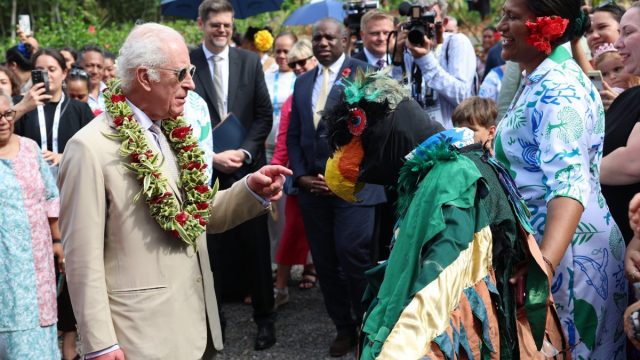In a surprising turn of events, King Charles III faced a public outcry during his recent visit to Australia.
As he and Camilla, the Queen Consort, made their way through the streets, they encountered hecklers who shouted at them to “go home.”
However, the most notable incident occurred within the hallowed halls of the Australian Parliament, where Senator Lydia Thorpe delivered a scathing rebuke that left many in shock.
Senator Thorpe’s heckling was not just a casual remark; it was a powerful statement against colonialism and the monarchy’s historical role in Australia.
The moment unfolded as the King finished a speech, and Thorpe seized the opportunity to voice her discontent.
The atmosphere in the chamber shifted dramatically as she called out, “You are not our King!
You committed genocide against our people.
Give us our land back!” Her words echoed through the room, leaving King Charles visibly taken aback.
The incident quickly gained traction on social media, with clips of the heckling going viral.
It was a moment that many Australians found both embarrassing for the monarchy and empowering for those advocating for Indigenous rights.
The Auslan interpreter present continued to sign Thorpe’s passionate interjections, ensuring that her message reached everyone in attendance.
Thorpe later explained her actions, emphasizing that true sovereignty belongs to the Indigenous people of Australia, not to the British monarchy.
Her remarks highlighted a growing sentiment among many Australians who feel that the monarchy has yet to acknowledge its colonial past and the impact it had on Indigenous communities.
Media outlets around the world reported on this remarkable event.
Sky News Australia and Al Jazeera English both covered the story extensively, emphasizing the significance of Thorpe’s protest.
Headlines proclaimed the moment as a stark reminder of the unresolved issues stemming from colonization, with many calling for reparations and a formal treaty with Indigenous Australians.
The responses on social media were overwhelmingly supportive of Thorpe.
Many users praised her courage and highlighted the importance of addressing historical injustices.
One tweet that gained significant traction received over 548,000 views, underscoring the public’s engagement with the issue.
It became clear that this incident resonated deeply with many who are frustrated by the monarchy’s silence on these matters.
Interestingly, this wasn’t the first time a member of the royal family faced backlash during an overseas visit.
Previous trips have also seen moments of discomfort, such as when Prince William and Kate faced criticism in the Caribbean.
In contrast, Harry and Meghan’s visits to Canada and other countries were met with warmth and enthusiasm, suggesting a distinct difference in public perception.
King Charles, while representing the monarchy, is now seen as a symbol of its historical baggage.
Many believe that an apology for past wrongs would go a long way in mending relationships with Indigenous peoples and others affected by colonialism.
Critics argue that the monarchy’s reluctance to confront its past only fuels anger and resentment.
As King Charles sat in the Australian Parliament, he had no choice but to absorb the full weight of Thorpe’s words.
The awkwardness of the moment was palpable, and one could only imagine the internal struggle he faced as he listened to the senator’s impassioned plea for justice.
The broader implications of this incident extend beyond mere embarrassment for the King.
It raises critical questions about how the monarchy engages with its colonial history and the ongoing struggles for recognition and reparations by Indigenous communities.
Thorpe’s actions have sparked a conversation that many believe is long overdue.
The call for accountability and acknowledgment of past atrocities is gaining momentum, and her bold stance has inspired others to speak out.
As discussions around these topics continue, it remains to be seen how the monarchy will respond to the growing demands for change.
In light of these events, what do you think?
Was Senator Lydia Thorpe right to voice her concerns so publicly?
Many see her as a brave advocate for truth and justice, challenging the status quo and demanding recognition for the wrongs of the past.
Related Stories

